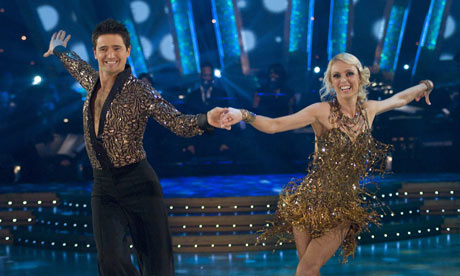Keep on dancing
Every Saturday evening, sixteen million people turn on their televisions for two hours to watch Strictly Come Dancing, and turn on again the following night to see the results. But why? Why should a dance competition captivate the nation so much? It’s not Brucie’s jokes. And I can’t really believe that people turn on to see the redoubtable Ann Widdecombe express her desperate need for attention in one more ritual humiliation. No, I think it’s the romance of it all.
Dance is the physical expression of romantic love. Every week, we witness transformation in dance. Under the guidance of their professional partners, C list celebrities; rugby players, singers, actors, even politicians, who have never before trod the fantastic light, develop the confidence and attitude to dance. And as they improve, the relationship between the couples gets closer until they almost seem to merge and move together as one. It’s like watching people fall in love. The women all lose weight and glow with passion; the men perform like Gods. Urged on by the comperes and the judges, week by week they take more risk. We fear the crash – but at the same time desire it. This is compulsive viewing.
Pamela Stephenson, psychotherapist and one time comedienne, now one of the contestants, described it like this. ‘ Suddenly you’re in this hot bed of emotion, locking loins, arguing, fighting, making up, hugging. The professionals are very attractive, very intimate, very attentive, very emotional. It’s very hard not to fall in love a bit and that for some, can be very confusing.’
Contestants may enjoy the sensation of having their heads in the clouds but they have to keep their feet on the ground. Nabokov once defined fame as a stranger caught in their own snapshot, but they mustn’t let themselves believe in it. Celebrities are commodities for projection. We, the voyeurs, enjoy the frisson with desire and dread.
Love is not for the faint hearted. It’s a dangerous business; full of conflict and ambivalence. Dance, like courtship displays in birds and mammals, expresses the desire, the fear, the aggression, the affection.
If you truly love somebody, all meaning is invested in that person. Even the most mundane aspects of life are enhanced by the most intense colours, textures and tones. But if that love fails, that intensity suddenly evaporates and life loses its meaning. It’s all or nothing, life or death. So the dreadful danger of love is the disillusion and devastatation; the death of the spirit that ensues from a catastrophic loss of meaning. The professionals understand this; they never really lose themselves in the dance, they have the technique to act ‘as if’.
But how precarious for those learning to dance for the first time; they stand on the edge, make to go and then hold back, and their body can expresses the ambivalence and spoil the performance. They lack the technique that experience provides, to make it up. They have to dance with their heart or not at all. That’s why the judges, especially the effusive Bruno Tonioli, are all the while exhorting contestants to let go. Love can make any of us dance perfectly!
But it can be so difficult to trust. If we give ourselves to another person, then we lose our autonomy. We may crave the freedom of love, but we fear the dependence, because therein lies self deception and delusion. People don’t fall in love with another person; they fall in love with themselves or more accurately, the enhanced image of themselves they see in their lover’s eyes?
Fear of solitude and nothingness encourages us to take refuge in love, but fear of entrapment may cause us to flee it. Dance is the enactment of the ambivalent; cynicism; the elevated eyebrow of fear?
But let’s be positive. Love is such wonderful make believe. Even by proxy, it has the potential to create such poignant joy. How dull life would be without that dangerous hope?
So take care but not that much. And keeeeeep dancing!
The same applies to the bland, self satisfied conviction, the hand-me-down intimation of bliss that is spiritual love. Do you really need to relinquish your soul in the service of your God? Spiritual leaders grow fat on the respect and adoration of their disciples. And the faithful thrive on the illusion of righteousness. But human beings never got anywhere by sitting on a mountain contemplating nirvana just because they don’t dare to express their own thoughts and desires. Religions have always been based on fear.



